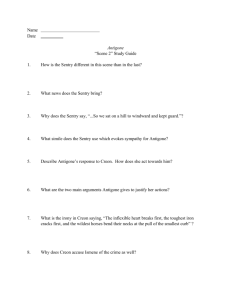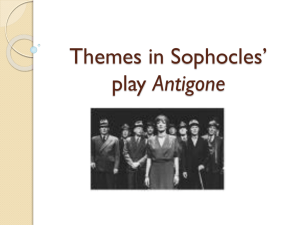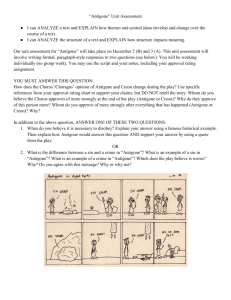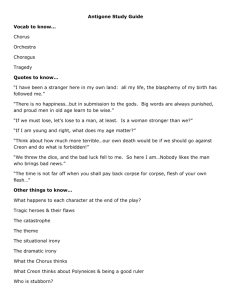Antigone Quotations Explained: Study Guide
advertisement
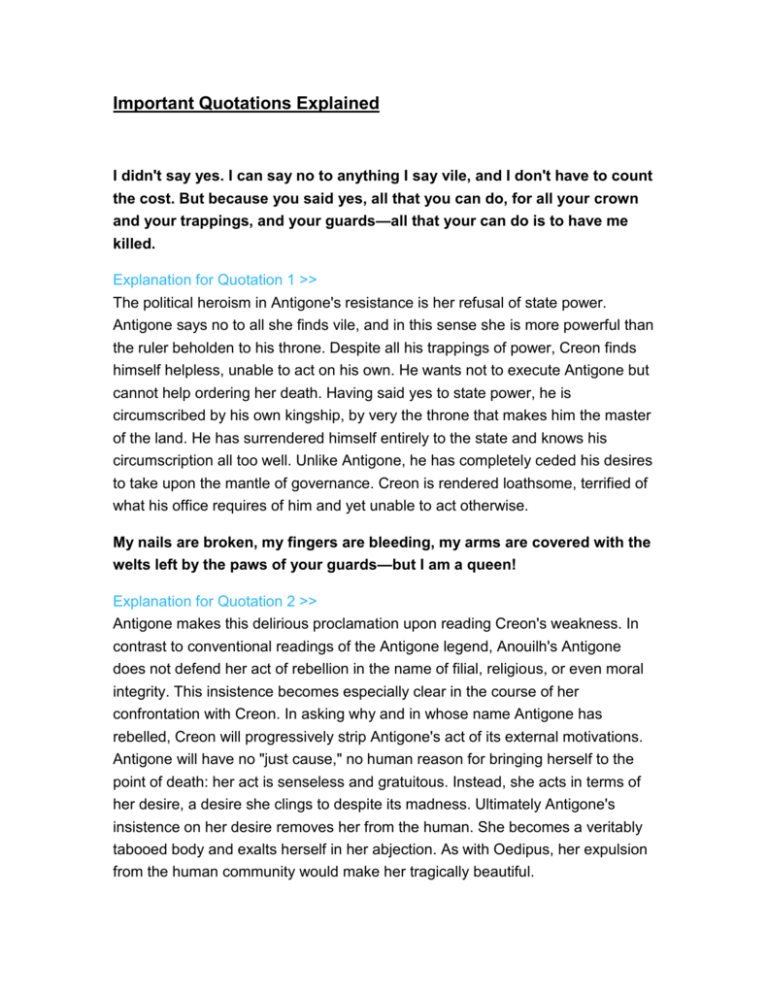
Important Quotations Explained I didn't say yes. I can say no to anything I say vile, and I don't have to count the cost. But because you said yes, all that you can do, for all your crown and your trappings, and your guards—all that your can do is to have me killed. Explanation for Quotation 1 >> The political heroism in Antigone's resistance is her refusal of state power. Antigone says no to all she finds vile, and in this sense she is more powerful than the ruler beholden to his throne. Despite all his trappings of power, Creon finds himself helpless, unable to act on his own. He wants not to execute Antigone but cannot help ordering her death. Having said yes to state power, he is circumscribed by his own kingship, by very the throne that makes him the master of the land. He has surrendered himself entirely to the state and knows his circumscription all too well. Unlike Antigone, he has completely ceded his desires to take upon the mantle of governance. Creon is rendered loathsome, terrified of what his office requires of him and yet unable to act otherwise. My nails are broken, my fingers are bleeding, my arms are covered with the welts left by the paws of your guards—but I am a queen! Explanation for Quotation 2 >> Antigone makes this delirious proclamation upon reading Creon's weakness. In contrast to conventional readings of the Antigone legend, Anouilh's Antigone does not defend her act of rebellion in the name of filial, religious, or even moral integrity. This insistence becomes especially clear in the course of her confrontation with Creon. In asking why and in whose name Antigone has rebelled, Creon will progressively strip Antigone's act of its external motivations. Antigone will have no "just cause," no human reason for bringing herself to the point of death: her act is senseless and gratuitous. Instead, she acts in terms of her desire, a desire she clings to despite its madness. Ultimately Antigone's insistence on her desire removes her from the human. She becomes a veritably tabooed body and exalts herself in her abjection. As with Oedipus, her expulsion from the human community would make her tragically beautiful. if Haemon reaches the point where he stops growing pale with fear when I grow pale, stops thinking that I must have been killed in an accident when I am five minutes late, stops feeling that he is alone on earth when I laugh and he doesn't know why—if he too has to learn to say yes to everything— why, no, then, no! I do not love Haemon! Explanation for Quotation 3 >> Antigone recants her love for Haemon toward the end of her confrontation with Creon. Creon has unmasked her brothers as treacherous gangsters, making her act and death march entirely gratuitous. Its political, moral, filial, and religious motivations appear entirely external. Thus Creon offers the dazed Antigone the promise of human happiness. This vision of human happiness provokes Antigone's final, fatal explosion. She refuses to moderate herself: she will have everything as beautiful as it was when she was a child or die. Anouilh underscores the infantile quality of this desire: Antigone's fiery love recalls the plight of a child who cannot handle the even momentary loss and separation of the beloved. Antigone insists on her desire in its primary form. As for those three red-faced card players—they are the guards. One smells of garlic, another of beer; but they're not a bad lot. They have wives they are afraid of, kids who are afraid of them; they're bothered by the little dayto- day worries that beset us all. At the same time—they are policemen: eternally innocent, no matter what crimes are committed; eternally indifferent, for nothing that happens can matter to them. They are quite prepared to arrest anybody at all, including Creon himself, should the order be given by a new leader. Explanation for Quotation 4 >> In the prologue, the Chorus directly addresses the audience and appears selfconscious with regards to the spectacle: we are here tonight to take part in the story of Antigone. Unlike conventional melodrama, for example, we are not asked to suspend our disbelief or watch a spectacle that would seamlessly pass itself off as reality. Like its ancient predecessor, the Chorus prepares a ritual. In hits preparation, it introduces all of its players under the sign of fatality. They have come to play their roles and, if such is their fate, die. The Chorus is omniscient, narrating the characters' very thoughts. The three Guardsmen are particularly crucial to the political allegory the play offers of the fascist collaboration. The trio, which symbolizes the fascist collaborators or collabos of Anouilh's day are made all the more mindless and indistinguishable in being grouped in three. They also emerge from a long tradition of the dull-witted police officer. They are eternally indifferent, innocent, and ready to serve whatever powers that be. This indifference not only inures them to the tragic, also but makes them brutal and dangerous. Every kind of stillness. The hush when the executioner's ax goes up at the end of the last act. The unbreathable silence when, at the beginning of the play, the two lovers, their hearts bared, their bodies naked, stand for the first time face to face in the darkened room, afraid to stir. The silence inside you when the roaring crowd acclaims the winner—so that you think of a film without a sound track, mouths agape and no sound coming out of them, a clamor that is not more than picture; and you, the victor, already vanquished, alone in the desert of your silence. That is tragedy. Explanation for Quotation 5 >> Stillness appears as a key metaphor in the Chorus's comments on the nature of tragedy. First the Chorus evokes this stillness in its theatrical mode. This stillness is equated with the spring-like tension and sense of suspense in tragedy that it evokes earlier. Tragedy's stillness appears in the moment before the execution, the moment at the beginning of a play before the consummation of a love affair. This tension only finds release in the terrible, ecstatic shout. Note this conjunction of sex and death. The stillness of sex and death is precisely where the play's two lovers will ultimately end, lain together in the tomb that figures also as their "bridal bed." Strangely, the Chorus then invokes a filmic metaphor. Tragic stillness is the silence within the spectator when the crowd acclaims the victor. This stillness within perhaps recalls the "hollow space" imagined by Antigone earlier. This inner silence turns the outer world into "no more than a picture," a film without a sound track. This dissociation of sound from the image of the world is a dissociation of the spectator from that world as well. Again, two disjunctions are at work here: that of the sound from the image and the spectator from the world-become image. The Chorus shifts from a theatrical to filmic metaphor here because these experiences of disjunction are inherent to, though covered over in, the cinematic apparatus. The spectator is then identified with the already vanquished victor, who is similarly alone in a desert of silence, similarly disjoined from the world. This disjunction from the world is the plight of the tragic hero and spectator who identifies himself with him.

